2024 Election

Trump's barrage of executive orders, policy decisions and campaign appointments is overwhelming in its extremism. It is designed to provoke a feeling of panicked helplessness among those who oppose his plans for immigrants, LGBTQ+ people, and other targets of his vision for our country. But we do not have to give Trump what he wants and, by staying rooted in our faith, can undermine his campaign of shock and awe.
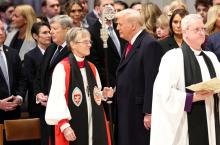
But before her sermon concluded, Budde addressed the president directly:
“Let me make one final plea, Mr. President: Millions have put their trust in you, and as you told the nation yesterday, you have felt the providential hand of a loving God. In the name of our God, I ask you to have mercy upon the people in our country who are scared now. There are gay, lesbian, and transgender children in Democratic, Republican, and independent families, some who fear for their lives.
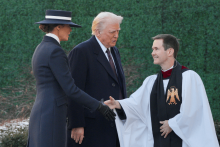
Rev. Robert W. Fisher, the rector of the church, told Sojourners in an email before the service that the church was making a concerted effort to return the service to its traditional roots. “The service is meant to be centered on God and humility before the almighty, and to be a call to ‘the better angels of our nature’ for those who are entering into a new season of service,” Fisher wrote in an email.
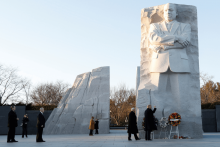
The juxtaposition is hard to ignore: President-elect Donald Trump, who launched his political career by questioning — without evidence — the citizenship of our country’s first Black president, will take his second oath of office on the day we remember and honor Rev. Martin Luther King Jr., this country’s greatest champion for civil and human rights. Though I hope and pray Trump’s second term will follow the moral vision we honor every year on King’s birthday, I fear the dream King cast for America is much more akin to Trump’s nightmare.
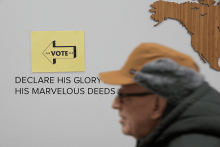
As countless Christians have expressed their disappointment with the results of the presidential election, many have heard in response platitudes such as “God is still on the throne” or “God is not Republican or Democrat.” Zach Lambert has heard those messages before. But as lead pastor of Restore Austin, he and his Texas team took a different approach. Instead of trying to “turn eyes heavenward,” his team worked to remind their church that God was with them in their grief and struggle.
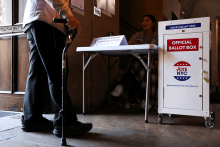
During the 2024 August primary election, a Detroit man called the Election Protection Hotline to report an accessibility issue at a polling location. The man, who had a mobility disability, went to vote at a church in the city where he was met with a flight of stairs but no ramp. He was forced to get out of his wheelchair and climb the stairs on his hands and knees before he could cast his vote.

I want to draw a careful distinction between saying that God can use an earthly event like an election to accomplish God’s purposes in the world and the claim that God — not the majority of American citizens who voted in the election this past November — chose Trump to become president.
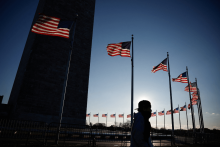
Friends and colleagues have mentioned how the news alert ping of each new nomination can often leave them feeling frozen with dread or just wanting to unplug from the news altogether. I can relate. But I want to offer a better way forward that’s rooted in my values as a Christian — a way to engage that doesn’t leave me feeling trapped in anxiety or resignation.
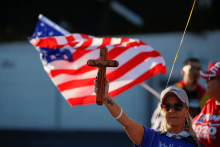
For faith activists and leaders committed to continuing their work to oppose and resist Christian nationalism, President-elect Donald Trump’s return to the White House is disappointing but not a sign of total defeat. Ahead of Inauguration Day, many activists are continuing their coalition-building efforts and sounding the alarm on specific policies they believe Trump may sign executive orders on, day one in office.

We are in for a difficult four years as a country. During the first four years of Donald Trump’s administration, I did not hesitate to call him a fascist, and looking ahead to his next four years, I am so worried about vulnerable people in this country. I am worried about immigrants. I am worried about queer people and trans kids. I am worried, yes, but I know that even in the most difficult time, miracles are possible.
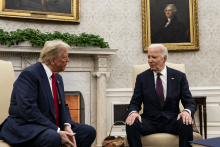
As a person of faith, I am deeply concerned about what the outcome of this election means, especially for those who will be most vulnerable to threats of mass deportations, retaliation against perceived political enemies, and other actions planned by the incoming administration. Yet we must not follow the example set by the president-elect and his followers: We can and should acknowledge the recent election results as legitimate, even if we are pained by them. I am hopeful that we can use this moment to break the fever of election denialism and rebuild trust in our election system — a shift that will be critical for future elections. Equally critical will be our commitment to advance justice and peace, a commitment that requires us to roundly reject the siren songs of violence, conspiracy theory, and anti-democratic methods.

The next four years will be a climate train wreck. Trump and his ilk will dismantle as many policies and regulations as they can. Autocrats and newly influential far-right parties the world over will be emboldened to “drill baby, drill.” More parts of the world will burn, flood, and turn into desert. Refugees — who are treated with God’s passionate care in the Hebrew Bible — will be scorned, vilified, detained, and deported at borders and in global northern countries around the world. It will be painful. And yet, based on the patterns already in place, the world will do its best to look away.

Rev. Jes Kast started planning for the Sunday after the election in midsummer, before her three-month sabbatical. She’d timed her leave intentionally, wanting to return to her congregation well-rested, right before one of most contentious elections in U.S. history. “I had a sense in my spirit that this next phase in ministering, whatever the outcome of the election, would require me to be as spiritually grounded as possible,” said Kast, who pastors Faith United Church of Christ in State College, Pa.

Concession speeches can reveal a glimpse of a politician’s soul, a rare look behind a curated facade. All they have poured their life into, with boundless ambition, hope, and relentless energy, has been lost. They are laid bare, vulnerable. And their words now don’t have to be calculated or pretested by a focus group.
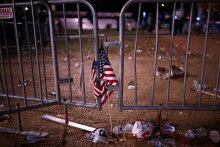
I’ll admit I struggle to face the reality that many in our country — roughly 51 percent of the popular vote, according to current estimates — are feeling some combination of elation, pride, and excitement that their chosen candidate has won. Even in my pain and grief, I know that as a follower of Jesus, I am called to pray for the incoming Trump administration and the people who voted for it. I’m committed to doing that work, but I confess: It feels hard right now.
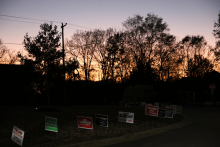
As I’ve thought about what will sustain me in the days ahead, I’ve been heartened to remember that we are not the first people who have struggled to be faithful under the thumb of oppressive leadership. I’ve especially been thinking of the stories in Exodus: Shiphrah and Puah, the courageous midwives who rejected Pharaoh’s demand to murder male children (Exodus 1:15-22), God’s promise to Moses (Exodus 3:12), and Miriam who led her people in song after escaping the confines of slavery in Egypt (Exodus 15:20-21).
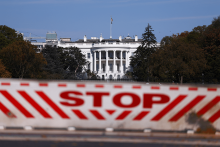
Trump’s campaign was marked by racist and misogynistic rhetoric, promises of authoritarian tactics including dramatic expansion of executive power and retribution for his political rivals, as well as policies that appealed to the anxieties of conservative religious communities, especially Christians.
As faith and justice leaders absorbed the news of a second Trump term, many pointed to the importance of fostering and caring for self and neighbor while figuring out what to do over the next four years.

President-elect Trump, according to the Associated Press, has won the White House. He won the election in part by courting conservative religious communities — and appealing to their anxieties — on the campaign trail. His policy agenda will likely be shaped by these groups, influencing the White House on a range of issues from education to reproductive rights.

In the synoptic gospels, when the currents swelled and wind howled, Jesus woke up during the storm that threatened the lives of his disciples. Although the disciples questioned his authority and were terribly afraid, Jesus woke from his sleep and settled the waves with the sound of his voice. And even though Jesus scolded them, the disciples were safe and the boat sailed on. As we think about the pending uncertainty of the 2024 election, there’s something reassuring in that story for me: God was present in the storm.

According to recent polling, 7 out of 10 Americans are feeling anxious about the 2024 presidential election. And as Election Day draws near, many churches and faith groups are trying to help alleviate some of that anxiety by opening their doors — and virtual spaces — for prayer.